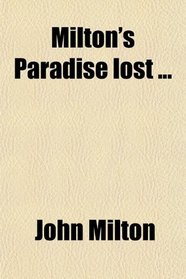Search -
Milton's Paradise lost ...
Milton's Paradise lost
Author:
Purchase of this book includes free trial access to www.million-books.com where you can read more than a million books for free. This is an OCR edition with typos. Excerpt from book: NOTES. 1. first disobedience. Until Adam sinned and disobeyed God man was without sin. 2. that forbidden tree, the tree of the knowledge of good and evil, ... more »
Author:
Purchase of this book includes free trial access to www.million-books.com where you can read more than a million books for free. This is an OCR edition with typos. Excerpt from book: NOTES. 1. first disobedience. Until Adam sinned and disobeyed God man was without sin. 2. that forbidden tree, the tree of the knowledge of good and evil, ... more »
ISBN-13: 9780217517423
ISBN-10: 0217517420
Publication Date: 8/15/2009
Pages: 132
Rating: ?
ISBN-10: 0217517420
Publication Date: 8/15/2009
Pages: 132
Rating: ?
0 stars, based on 0 rating
Publisher: General Books LLC
Book Type: Paperback
Other Versions: Hardcover
Members Wishing: 0
Reviews: Amazon | Write a Review
Book Type: Paperback
Other Versions: Hardcover
Members Wishing: 0
Reviews: Amazon | Write a Review




